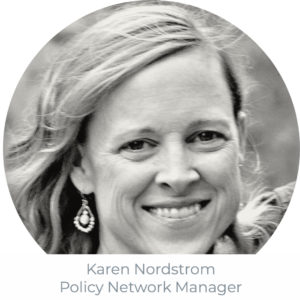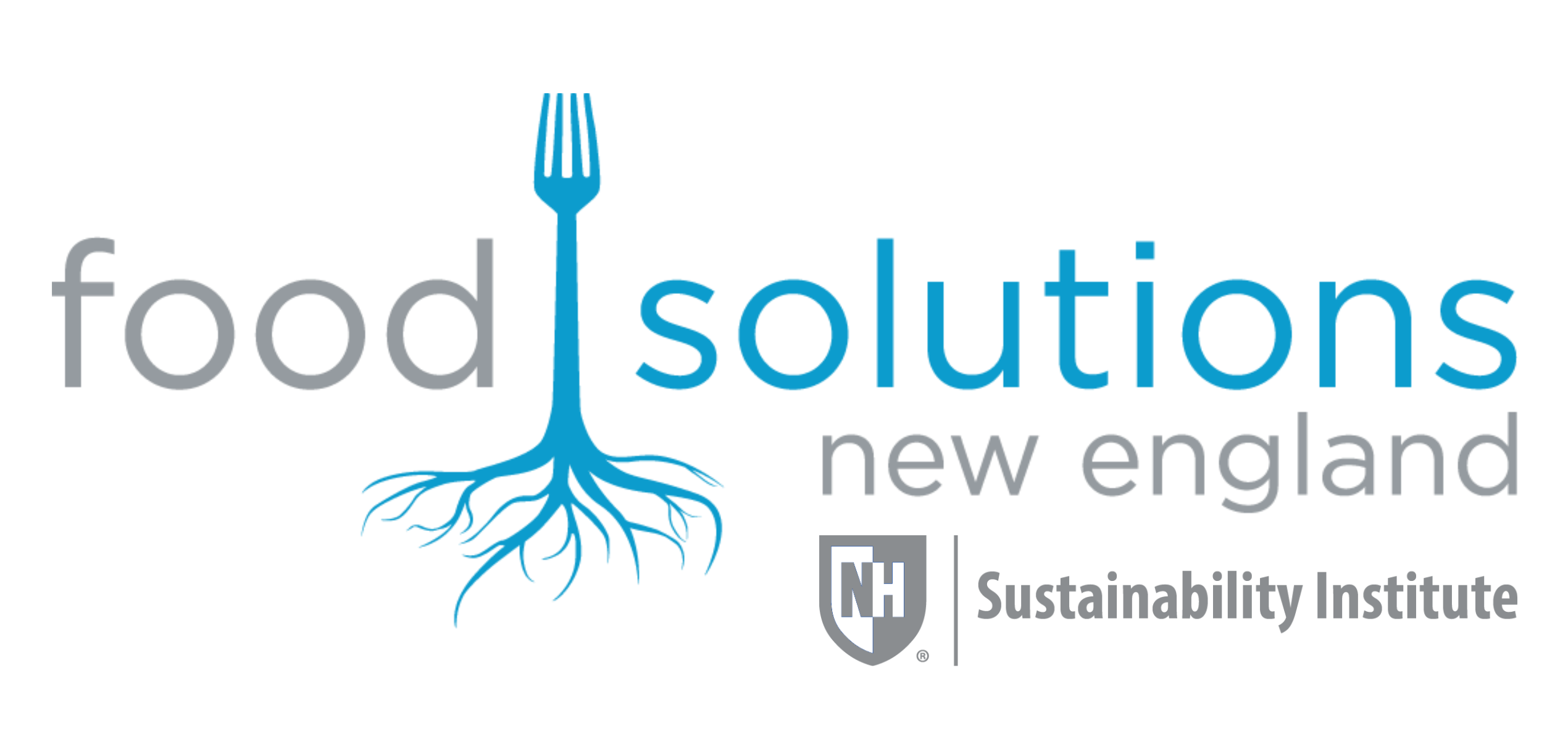A report back from the NHFA Statewide Gathering by FSNE’s Policy Network Manager, Karen Nordstrom
 The New Hampshire Food Alliance held its annual Statewide Gathering on May 13 at the Barn on the Pemi in Plymouth, NH. Submitting a proposal to facilitate a session centered on FSNE’s visionary policy initiative, during the depths of winter and while new to my current policy role, I envisioned emerging from the cold and stepping into, literally and figuratively, a spring in bloom; one reflective of my own personal growth, an edge influenced by my intentional step into this policy network manager role. Experiencing an in-person gathering after two years of lockdown, and being new to the NHFA network, I engaged my beginner’s mind–soaking up the rich work taking place in New Hampshire, connecting it to what I’ve been learning about the region, and applying it to an emergent intersectional 4F (food, farms, forests, and fisheries) policy platform focused on legislation, administration, and governance through a racial equity and justice lens. Given this context, I offer my reflections on the gathering from this policy perspective by highlighting examples of New Hampshire policies relevant to the region, providing a recap from our FSNE policy session, and sharing gleaned insights through my eyes widely opened to the many organizations and actors undertaking essential work for food systems transformation in the Granite State.
The New Hampshire Food Alliance held its annual Statewide Gathering on May 13 at the Barn on the Pemi in Plymouth, NH. Submitting a proposal to facilitate a session centered on FSNE’s visionary policy initiative, during the depths of winter and while new to my current policy role, I envisioned emerging from the cold and stepping into, literally and figuratively, a spring in bloom; one reflective of my own personal growth, an edge influenced by my intentional step into this policy network manager role. Experiencing an in-person gathering after two years of lockdown, and being new to the NHFA network, I engaged my beginner’s mind–soaking up the rich work taking place in New Hampshire, connecting it to what I’ve been learning about the region, and applying it to an emergent intersectional 4F (food, farms, forests, and fisheries) policy platform focused on legislation, administration, and governance through a racial equity and justice lens. Given this context, I offer my reflections on the gathering from this policy perspective by highlighting examples of New Hampshire policies relevant to the region, providing a recap from our FSNE policy session, and sharing gleaned insights through my eyes widely opened to the many organizations and actors undertaking essential work for food systems transformation in the Granite State.
Laura Carbonneau (Food Connects) and Nancy LaRowe (Vital Communities) led an introductory session on “building a climate-resilient food system,” defining a climate-resilient system as one that is reliable, equitable, and regenerative, and grounded in values for social justice and healthy food. Laura highlighted her marketing and outreach role in a food hubs network invested in local supply chain resiliency. She described how effective transport brought the freshest foods to local schools, while “strengthening rural independence in the face of global uncertainty.” I also overheard a buzz of conversation topics related to seed saving, regenerative farming, and Northeast climate migration throughout the hour-long interactive session, as they prompted us to help them uncover bottlenecks and gaps in the system that need to be addressed. They sought to identify additional organizations and people in the state working toward a climate-resilient food system so that they could uplift their stories to fuel further action.
For the second session, I attended the New Hampshire Farm & Food Policy Roundup, a state-level policy strategy session with Elise Bolster (NH Food Bank), Tiffany Dodier (NH Hunger Solutions), and Nikki Kobb (NOFA-NH). They framed their session in terms of policy for systems change and described how their collective work for food security in the state operates in the context of two-year legislative cycles. From the low hanging fruit of filing an annual SNAP outreach plan (SB 404) and re-establishing SNAP for Women, Infants, and Children Farmers Market Nutrition Program (SB 403) to the challenges faced in advocating for a Local Food for Local Schools Reimbursement Bill (which didn’t pass, but will be brought back with bipartisan support to build on the work already done), these policy advocates came together to reinforce upon us the importance of maintaining contact with and informing legislators through bill action. Additional bill topics raised were focused on healthy soils, organic dairy, pollinator protection, and meat/dairy processing. These topics linked their policy work to federal American Rescue Plan Act funding and to 2023 Farm Bill policy advocacy. Inspired by this policy team, I share quotes from their session: “Policy change helps system change,” “People in the field know best about what is needed, and they have ideas about how to get there,” and “Anecdotes get bills passed.”
During our session, “Help Shape FSNE’s Visionary Policy Platform,” attendees representing a range of sectors provided feedback on our four policy framings for participant dialogue: Universal Healthy Food; No Net Loss Farms & Forests, Net Gain Fisheries; Sustainable Food Systems Help Alleviate Climate Change; and A Post-Covid Regional Supply Chain Centers Social and Ecological Resilience. We shared a range of policies from the region that exemplified progress on key issues, including: Universal Free School Meals legislation (VT); Maine’s constitutional amendment on the Right to Food; the Northeast Atlantic Marine Alliance campaign to stop the AQUAA Act, which would allow industrial ocean fish farms in federal waterways; CT’s climate-smart agricultural practices and USDA Local Food Purchase Assistance Cooperative Agreement; and the Southern New England Farmers of Color Project, which provides education and training for beginning farmers of color in RI, CT, and MA. In addition, we put forth aspirational policies for their consideration, including the Rights of Nature Laws that apply personhood and legal rights to natural systems entities (eg. riverways) and values-based ocean farming (eg. a “Seaweed Commons”) that links indigenous communities to various forms of mariculture. Given these framings and examples, participants identified key levers and necessary steps toward regional food systems transformation, as follows:
Universal Healthy Food
Participants focused on a range of issues relevant to their work centered on food access, land access and tenure, conservation of natural resources, sustainable fisheries, climate resiliency, farm viability, and the grand challenge of tackling corporate consolidation. They identified the food supply chain, and advocacy for state and federal funding through the collective impact that comes from collaboration, connection, and farmers’ stories, to be key drivers of change.
No Net Loss Farms & Forests, Net Gain Fisheries
Participants identified the following key drivers of change: fisheries policies in support of entry-level fishermen and policies that increase institutional purchases of local (sea)food; a seafood branding campaign that indicates the point of origin and community education focused on community-supported fisheries; increased funding for the USDA Conservation Reserve Program for working lands; enhanced infrastructure for working lands and waterfronts, and smart growth surrounded by agricultural fields and forests. These policy levers would lead to action, such as mandates requiring a place of origin label on all seafood; subsidies and a “permit bank” for entry-level fishermen to obtain permits; non-polluting vertical arrays for shellfish production; increased funding for beginning farmer training; federal divestment from land grabs, particularly stolen land from BIPOC farmers and landowners; and restructured tax policies to support organic farming that keeps family farmers on the land.
Sustainable Food Systems Help Alleviate Climate Change
Key drivers of change identified by participants included: carbon sequestration supported by local food production; grant-funded diversity-centered workforce development; transportation that supports local food production and provides recovery transport; and incentives, both for grocers who would donate unsold produce to local food banks, and to farmers who would benefit from climate incentives, like those offered through the USDA NRCS.
A Post-Covid Regional Supply Chain Centers Social and Ecological Resilience
To center social and ecological resilience in post-COVID-19 regional supply chains, participants referenced leveraging successful regional policies and practices. Farm To Institution New England’s Metrics Dashboard, which measures local food procurement by schools, colleges, and hospitals, was referenced as were practices that would increase “shelf space” for local and regional foods in the grocery sector and food hub distribution in historically underserved geographical areas. Records of supply chain issues, whistleblower protections in the face of corporate consolidation, and USDA enforcement of antitrust laws were additional cited levers that bridged regional and federal levels of scale. Since the gathering, Senators Elizabeth Warren and Mike Rounds have introduced a bipartisan resolution directing the FTC to investigate anti-competitive practices and violations of anti-trust laws in the beef-packing industry, a bill that aligns with the National Farmers Union Fairness for Farmers campaign and two bipartisan bills (the Cattle Price Discovery and Transparency Act of 2022 and S.3870, the Meat and Poultry Special Investigator Act of 2022) framed by food supply chain resiliency aimed to improve competition and transparency in the livestock industry. (See the June FSNE policy update for more detail on this topic.)
Now that I’ve returned to Vermont and to the realities of rising COVID rates and work from Zoom, I’ve had a chance to digest this experience and consider how it informs my networking role with FSNE. For instance, I am prompted to share the work of NEFNE, a regional project which aims to support food supply chain resiliency throughout New England. To advance such activity aimed at transformation in the region, I encourage you to continue to share your ideas for regional visionary policy with me so that we may continue to develop a regional platform that aligns with A New England Food Vision. And, I offer my deep gratitude and respect to the food systems leaders that carved this path that allowed so many of us to gather this year– whether meeting for the first time or reconnecting after years apart – in the beautiful spaces of the Barn on the Pemi. May we bow to the land and dedicate an offering of merit to this beautiful and complex world that sustains us, in honor of our collective and transformational work.




